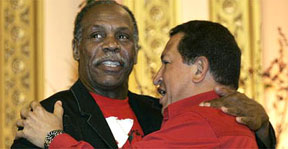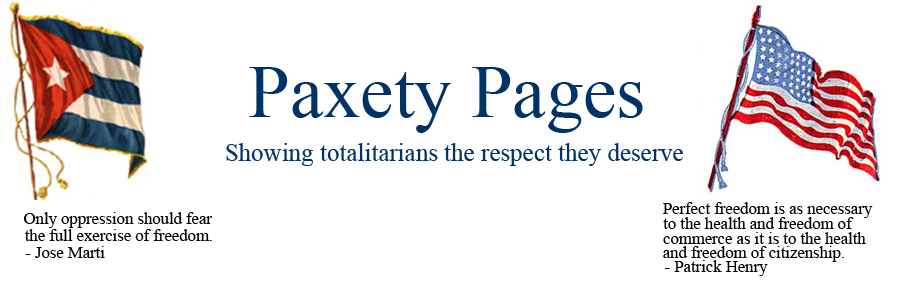Ignoring slavery in Venezuela
 Venezuelan big mouth hugo chavez says he will give the race warlord Danny Glover $18-million dollars to finance a move. The topic? Slavery, of course. From The Guardian Unlimited:
Venezuelan big mouth hugo chavez says he will give the race warlord Danny Glover $18-million dollars to finance a move. The topic? Slavery, of course. From The Guardian Unlimited:
Venezuela is to give the American actor Danny Glover almost $18m (£9m) to make a film about a slave uprising in Haiti, with President Hugo Chávez hoping the historical epic will sprinkle Hollywood stardust on his effort to mobilise world public opinion against imperialism and western oppression.
The Venezuelan congress said it would use the proceeds from a recent bond sale with Argentina to finance Glover’s biopic of Toussaint Louverture, an iconic figure in the Caribbean who led an 18th-century revolt in Haiti.
Mr. chavez should stop worrying about Hari 200 years ago and pay more attention to his own country. Here’s what the U.S. State Department had to say about Venezuela and slavery only last year.
Venezuela is a source, transit, and destination country for women and children trafficked for the purposes of sexual exploitation and forced labor. Women and children from Colombia, China, Peru, Ecuador, and the Dominican Republic are trafficked to and through Venezuela and subjected to commercial sexual exploitation or forced labor. Venezuelans are trafficked internally and to Western Europe, particularly Spain and the Netherlands, and countries in the region such as Mexico, Aruba, and the Dominican Republic for commercial sexual exploitation. Venezuela is a transit country for illegal migrants from other countries in the region – particularly Peru and Colombia – and for Asian nationals; some are believed to be trafficking victims.
The Government of Venezuela does not fully comply with the minimum standards for the elimination of trafficking and is not making significant efforts to do so. The government made some clear improvements in anti-trafficking activities during the reporting period, such as training officials and undertaking initiatives to raise public awareness. Unfortunately, these increased activities were not matched by progress in prosecutions of traffickers. The government should increase investigation and prosecution efforts against traffickers, continue educating the public, and provide victim assistance geared to the specific needs of trafficking victims.
Prosecution
The Government of Venezuela improved efforts to apprehend suspected traffickers throughout the year; however, there were no reports of prosecutions or convictions of traffickers for the fourth consecutive year. Article 16 of the Organic Law Against Organized Crime, passed in September 2005, makes trans-border trafficking punishable with imprisonment for 10 to 18 years. Provisions of the 2004 Naturalization and Immigration Law could also be applied against transnational trafficking. These recent anti-trafficking laws do not address trafficking within the country. The Child Protection Act and various articles of the penal code could be used to prosecute internal trafficking, but many of these statutes carry low penalties. Laws against child trafficking provide for fines of one to 10 months’ salary. Stipulated punishment for the prostitution or corruption of minors is as little as three months in jail; repeat offenders may face three to 18 months’ imprisonment. In addition, laws against trafficking-related crimes generally were not enforced and some officials failed to distinguish the difference between traffickers and migrant smugglers. Authorities investigated a number of cases of transnational crime, but only four cases were clear instances of trafficking for labor or sexual exploitation. Six suspects awaited prosecution for cases initiated in the current and previous reporting periods. There were no reports that government officials participated in or condoned human trafficking, but corruption among immigration, identification, customs, and border patrol officials was widespread and may have contributed to the small number of trafficking cases reported.Protection
Venezuelan government services to assist trafficking victims remained inadequate during the reporting period. The government funded no NGO programs and operated no shelters designated specifically for trafficking victims. There were no witness protection or restitution programs to assist victims. Government shelters for battered women and at-risk children had limited space and inadequate services to meet trafficking victim needs. Government authorities did, however, negotiate the use of a government-owned building for an NGO working with trafficking victims. A domestic violence hotline operated by the National Institute for Women reportedly helped one trafficking victim seek assistance.Prevention
The government significantly increased efforts to raise awareness and train officials as the reporting period progressed. In December 2005, the government launched a national campaign to educate the public about the dangers of trafficking using posters and radio and television spots. The government also increased public awareness about trafficking by hosting a hemispheric meeting on trafficking and encouraging in-depth media coverage of the event both in Venezuela and throughout the region. The Ministry of Interior and Justice’s Crime Prevention Unit held 65 training sessions on identifying trafficking and illegal migration that reached 1,544 government officials in eight states. National toll-free crime line personnel received training for handling trafficking-related calls.Additionally, UNICEF estimates that almost 10% of Venezulan children were working in 2000. That does not include the children involved in begging, prostitution or drug trafficking. The U.S. Department of Labor has issued a full report on child labor in chavez’s country.
The State Department addressed the human rights situation in Venezuela in 2005.
Politicization of the judiciary, restrictions on the media, and harassment of the political opposition continued to characterize the human rights situation during the year. The government used the justice system selectively against the political opposition and implementation of a 2004 media law threatened to limit press freedom. The following human rights problems were reported:
- unlawful killings of criminal suspects
- torture and abuse of detainees
- harsh prison conditions including violence and severe overcrowding
- arbitrary arrests and detentions
- corrupt, inefficient, and highly politicized judicial system characterized by trial delays, impunity, and violations of due process
- dismissal or forced retirements of judges for political reasons
- unlawful taking of private property, including failure to make property restitution in such cases
- illegal wiretapping and searches of private homes and businesses
- official intimidation and attacks on the independent media, the political opposition, labor unions, courts, the Catholic Church, missionary groups, and human rights groups
- widespread corruption at all levels of government
- violence and discrimination against women, abuse of children, discrimination against persons with disabilities, and inadequate protection of the rights of indigenous people
- trafficking in persons
- restrictions on the right of association
Danny Glover, why aren’t you making a movie about slavery in Venezuela today?
Update – Fausta has observations, too.
